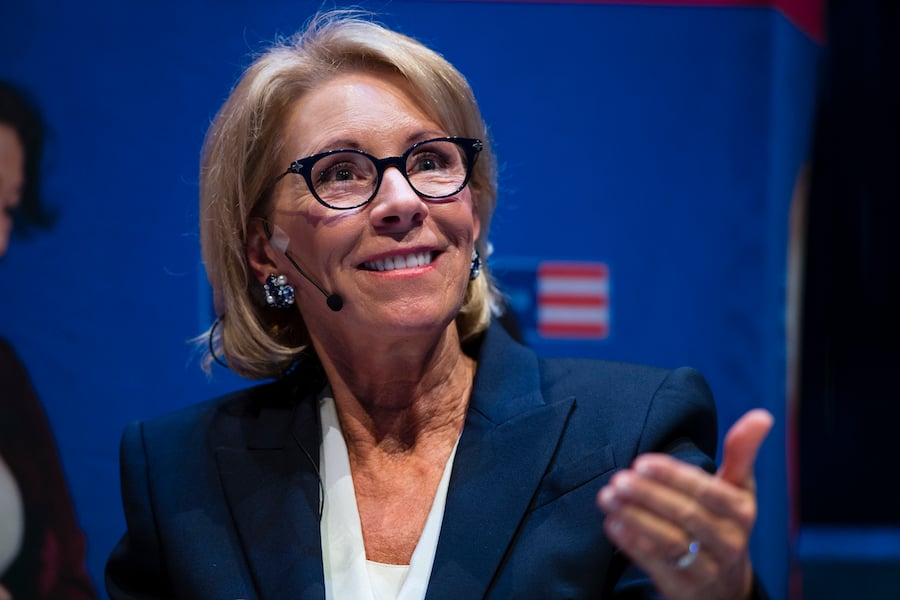SAN FRANCISCO (CN) --- Rejecting arguments that making a cabinet official testify threatens the separation of powers, a federal judge this week ordered former Education Secretary Betsy DeVos to answer questions about long delays and mass denials of student debt relief claims.
U.S. District Judge William Alsup found evidence of bad faith in the agency’s stated reasons for an 18-month halt in processing debt relief claims, among other factors, creates an extraordinary circumstance that warrants making DeVos sit down for a three-hour deposition.
“Even assuming Secretary DeVos retains some measure of executive prerogative, she must answer an appropriately issued subpoena,” Alsup wrote in an 11-page ruling Wednesday. “Judicial process runs even to unwilling executives.”
The testimony was sought in a class action brought by lead plaintiff Theresa Sweet in 2019. The lawsuit claims the Trump administration’s “pause” in processing borrower defense claims became a “policy of inaction and obfuscation” that prevented defrauded students from obtaining debt relief as required by law. The borrowers argued that long delays left more than 160,000 students “in limbo,” damaged their credit and permanently delayed their accumulation of wealth.
The U.S. Education Department had moved to quash the subpoena, arguing that court-ordered depositions of cabinet members are supposed to be exceedingly rare. The government cited the U.S. Supreme Court’s 1941 ruling in United States v. Morgan, which found it was improper for a lower court to make the Agriculture secretary testify at trial in a lawsuit over maximum rates for stockyard services.
Court orders that make high-level executive branch officials testify would “threaten the separation of powers, chill agency decision-making, discourage public service, and create potential for abuse or harassment,” the Education Department argued in its motion to quash the subpoena.
But Alsup cited numerous cases in which cabinet members were ordered to testify. He also noted “extraordinary circumstances” identified by U.S. appeals courts in which cabinet officials can be called to answer questions. Those circumstances include situations where a “strong showing of bad faith or improper behavior” are present, where an official has “unique and relevant first-hand knowledge” and where the necessary information cannot be obtained through “other less burdensome or intrusive means.”
Alsup surmised the reasons the secretary gave for an 18-month freeze on deciding borrower defense claims was contradicted by the department’s later actions. The department said it needed more time for “considered decision-making,” but when it resumed processing applications in December 2019, it used letters with boilerplate language to deny 94% of 78,400 claims in a matter of months.
Alsup wrote the decisions were issued “not at measured but breakneck pace, in perfunctory and unreasoned form-denial letters, at an alarming rate.”
He called it an “apparent pretext” and the “paradigm of agency bad faith” that goes against the presumption of agency “conscience and intellectual discipline” that supports the custom of generally not ordering cabinet officials to testify.
The judge further noted that lower-level department officials could not say who approved the boilerplate letters used to deny 94% of borrower defense claims. That denial rate stood in stark contrast to the Obama administration’s 0.8% denial rate.
“The high-level officials already deposed have disclaimed authority for that conduct and have instead pointed to the Secretary,” Alsup wrote.
The judge stayed his ruling for 14 days to give the government time to appeal.
Toby Merrill, director of the Project on Predatory Student Lending, which represents student borrowers in the lawsuit, said the Biden administration inherited a “massive problem” in handling student borrower defense claims from prior administrations.
“Instead of acting quickly to fix it, the Biden-Harris administration has spent its time trying to protect Betsy DeVos from testifying to expose what really happened with borrower defense, has left her entire team in place, and has extended her legacy of unacceptable inaction,” Merrill said in an emailed statement. “Our clients have been cheated by their schools and their government, and they should not be forced to wait one more day for the Department to do the right thing.”
An Education Department spokesperson insisted that the Biden administration is working to address problems with the system for evaluating borrower defense applications.
“The Biden administration is deeply committed to improving the borrower defense program, and is actively evaluating policy changes and improvements necessary to ensure that the program works well for all student loan borrowers,” acting Education Department assistant secretary Rachel Thomas said in an emailed statement. “That evaluation has already led to action that will enable tens of thousands of borrowers to receive 100% relief.”
Enacted in 2015 by the Obama administration, the borrower defense rule gave students who attended predatory for-profit colleges an avenue to have their loan debt forgiven. The rule was enacted as the government started cracking down on for-profit schools including ITT Technical Institute, Corinthian Colleges and DeVry University, which were investigated for deceiving students about post-graduation job prospects.
The Education Department previously agreed to settle the lawsuit in April 2020. It vowed to process more than 170,000 outstanding claims within 18 months and to wipe out interest that accrued on loans while those borrower defense claims were pending.
The settlement was ultimately rejected after plaintiffs accused the department of using “boilerplate language” to deny virtually all claims for debt relief, including for students who attended schools that were found to have engaged in fraud by the Federal Trade Commission and other federal and state agencies.
In his October 2020 decision denying the motion for settlement approval, Alsup wrote that the department was “issuing perfunctory denial notices utterly devoid of meaningful explanation at a blistering pace” and forcing borrowers to cope with a “disturbingly Kafkaesque” process for obtaining debt relief.
Subscribe to Closing Arguments
Sign up for new weekly newsletter Closing Arguments to get the latest about ongoing trials, major litigation and hot cases and rulings in courthouses around the U.S. and the world.









